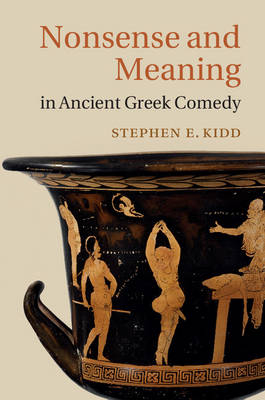
Nonsense and Meaning in Ancient Greek Comedy
Seiten
2014
Cambridge University Press (Verlag)
978-1-107-05015-0 (ISBN)
Cambridge University Press (Verlag)
978-1-107-05015-0 (ISBN)
This book employs the ancient Greek concept of 'nonsense' to explore an observation that has vexed comic scholarship: although comedy can be meaningful (i.e. contain political opinions, moral sentiments and aesthetic tastes), some part is just 'foolery' or 'fun'. It is important for all scholars and students of Greek comedy.
This book examines the concept of 'nonsense' in ancient Greek thought and uses it to explore the comedies of the fifth and fourth centuries BCE. If 'nonsense' (phluaria, lēros) is a type of language felt to be unworthy of interpretation, it can help to define certain aspects of comedy that have proved difficult to grasp. Not least is the recurrent perception that although the comic genre can be meaningful (i.e. contain political opinions, moral sentiments and aesthetic tastes), some of it is just 'foolery' or 'fun'. But what exactly is this 'foolery', this part of comedy which allegedly lies beyond the scope of serious interpretation? The answer is to be found in the concept of 'nonsense': by examining the ways in which comedy does not mean, the genre's relationship to serious meaning (whether it be political, aesthetic, or moral) can be viewed in a clearer light.
This book examines the concept of 'nonsense' in ancient Greek thought and uses it to explore the comedies of the fifth and fourth centuries BCE. If 'nonsense' (phluaria, lēros) is a type of language felt to be unworthy of interpretation, it can help to define certain aspects of comedy that have proved difficult to grasp. Not least is the recurrent perception that although the comic genre can be meaningful (i.e. contain political opinions, moral sentiments and aesthetic tastes), some of it is just 'foolery' or 'fun'. But what exactly is this 'foolery', this part of comedy which allegedly lies beyond the scope of serious interpretation? The answer is to be found in the concept of 'nonsense': by examining the ways in which comedy does not mean, the genre's relationship to serious meaning (whether it be political, aesthetic, or moral) can be viewed in a clearer light.
Stephen E. Kidd is Assistant Professor in Classics at Brown University, Rhode Island. He has published articles on Greek comedy as well as other topics like ancient dreams and games. His research interests center broadly around the role of play in ancient life and how such play affects modes of interpretation and evaluation.
Introduction; 1. Greek notions of nonsense; 2. Nonsense as 'no-reference': riddles, allegories, metaphors; 3. Nonsense as 'no-serious-sense': the case of Cinesias; 4. Nonsense as 'no-sense': jokes, puns, and language play; 5. Playing it straight: comedy's 'nonsense!' accusations; Conclusions.
| Verlagsort | Cambridge |
|---|---|
| Sprache | englisch |
| Maße | 160 x 233 mm |
| Gewicht | 450 g |
| Themenwelt | Kunst / Musik / Theater ► Theater / Ballett |
| Geisteswissenschaften ► Archäologie | |
| Geschichte ► Allgemeine Geschichte ► Vor- und Frühgeschichte | |
| Geschichte ► Allgemeine Geschichte ► Altertum / Antike | |
| Geisteswissenschaften ► Geschichte ► Regional- / Ländergeschichte | |
| Geisteswissenschaften ► Sprach- / Literaturwissenschaft ► Anglistik / Amerikanistik | |
| Geisteswissenschaften ► Sprach- / Literaturwissenschaft ► Literaturwissenschaft | |
| ISBN-10 | 1-107-05015-4 / 1107050154 |
| ISBN-13 | 978-1-107-05015-0 / 9781107050150 |
| Zustand | Neuware |
| Haben Sie eine Frage zum Produkt? |
Mehr entdecken
aus dem Bereich
aus dem Bereich
auf den Spuren der frühen Zivilisationen
Buch | Hardcover (2023)
C.H.Beck (Verlag)
20,00 €
Konzepte – Methoden – Theorien
Buch | Softcover (2024)
UTB (Verlag)
39,90 €
Was Pompeji über uns erzählt
Buch | Hardcover (2023)
Propyläen (Verlag)
32,00 €


